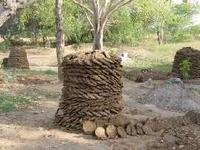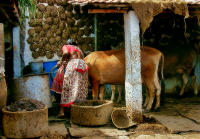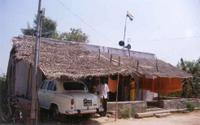Re-Discovering the scientific achievements of ancient India
 Recently while browsing the the subject of alternate fuel sources for the world, I came across an article on how scientists in USA are discovering that Cow Dung cake could be an alternate for regional fuel requirements within USA. It got me thinking on whether this was a "Discovery" at all ??
Recently while browsing the the subject of alternate fuel sources for the world, I came across an article on how scientists in USA are discovering that Cow Dung cake could be an alternate for regional fuel requirements within USA. It got me thinking on whether this was a "Discovery" at all ??
Rural India and the people in the countryside across the subcontinent have been using a combination of straw and cow dung as a source of fuel for centuries. I recall that as a kid I used to see cow dung cakes drying on the road sides and unused walls in the villages of Uttar Pradesh (Northern India) . I used to see similar cow dung cakes up for sun baking deep in the southern India too (Karnataka).  Our rich cultural heritage combined with highly developed written language system in ancient India gave us the competitive edge to collect and pass on the collective wisdom and knowledge generation on generation. It is because of this collective wisdom spanning centuries that we find day-to-day application of ancient scientific discoveries and achievements in various parts of India that ironically are called "rural and backward" in current context.
Our rich cultural heritage combined with highly developed written language system in ancient India gave us the competitive edge to collect and pass on the collective wisdom and knowledge generation on generation. It is because of this collective wisdom spanning centuries that we find day-to-day application of ancient scientific discoveries and achievements in various parts of India that ironically are called "rural and backward" in current context.
I wonder if the average Indian who is a descendant of the most ancient civilization on earth completely understands the significance of this collective scientific wisdom that our ancestors bestowed to India ?
It is paradoxical and somewhat saddening that while the western scientific fora is exploring the ancient practices of the east to find solutions for the increasing natural resource constraints being faced in the new world; The east is trying to ape the modernisation and advancement of the western world without realising that not all of these modern marvels are in harmony with nature and may not be sustainable in the times ahead.
 If at all we imbibe the know-how that western civilization has to offer and blend it with our historical achievements - we could in effect ensure that both mankind and the rest of the beings co-exist; thereby maintaining the delicate balance of nature.
If at all we imbibe the know-how that western civilization has to offer and blend it with our historical achievements - we could in effect ensure that both mankind and the rest of the beings co-exist; thereby maintaining the delicate balance of nature. tive Americans, Mayans and Hindu civilization must be rediscovered and shared with the youth of this generation.
tive Americans, Mayans and Hindu civilization must be rediscovered and shared with the youth of this generation. 

3 Comments:
Good article , keep it up.
This is w.r.t the question you have raised.. whether the average indian understands our collective scientific wisdom?
No, we do not. Why the average Indian? even the best Indian minds have presumed that other than for some formulae in vedic math, nothing else is worth taking another look. We immerse ourselves in western ideas. The fact that eventhough we were the most prosperous economy till the sixteenth century does not ring a bell for us to look into how our economies were..
The best response one would get if she were to say or write something about it is "ah, an interesting article" and nothing more. Otherwise, the average response ranges from accusing that you are either going nuts or becoming a fundamentalist..
To see the difference between our responses and the western responses to the energy crisis, look at the bio-fuel activities among rural communities in India and how the US looks to drill oil in Alaska..
thanks for the article.. yours is another invaluable voice of the few who beg to differ
Great article .. Really we should feel proud of our ancient heritage and culture which was not only spiritual but very advanced scientifically. whenever I hear the achievements of our ancestors; the scientist Rishis, the seers, I cannot but feel ashamed of our apathy and ungrateful attitude. It's time we owned up all of this beautiful scientific and spiritual heritage.
Also, I've heard that the cow dung is also very effective as a disinfectant. I've seen especially in the villages of Karnataka, the floor of the house smeared with cow dung for the same reason.
Post a Comment
<< Home